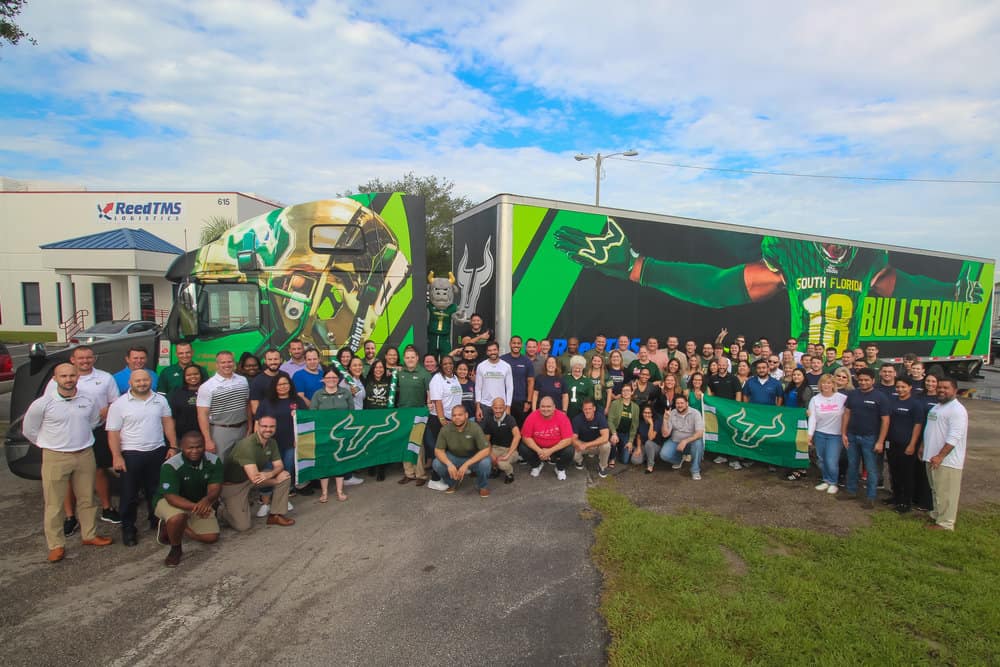It’s college football season and the staff at ReedTMS in Florida is all ready to root for their favorite team, the University of South Florida Bulls. They happen to be located in Reed’s hometown of Tampa.
They’re also going to root for Tulane. All hail the Green Wave of New Orleans!
(Heaven knows what the staff will do on November 3, when those two schools face off at a South Florida home game.)
And let’s hear a shoutout for the employees’ other favorite team, the Florida International Panthers.
All three teams have a contract with the asset division of ReedTMS, a Tampa based transportation and logistics company that gets these three schools’ equipment to and from every away game. In the case of South Florida, it also provides transportation service for equipment to the school’s home games, which are played at Raymond James Stadium in Tampa–also the home of the Tampa Bay Buccaneers–and not at an on-campus facility.
Jordan Strawn, ReedTMS’ chief sales officer, said he believes his company is the only transportation provider that has a deal with three separate college football programs. Notably, although the dance of getting a team’s gear to another stadium and quickly getting it home might seem like the work for the logistics division, it’s the asset division of Reed–which has 95 tractors–that moves the team. It’s done in one truck for each school that is decorated year-round to highlight the relationship. Whatever truck driver services the team for that week is a full-time Reed employee.
Not only that, but Strawn said Reed would like to get that three-team client list up to 10. “To be honest, it’s not very profitable from a monetary standpoint,” Strawn said of the contracts. But he cited a “multitude of reasons” why Reed not only continues with the South Florida relationship on a three-way deal, but has just recently added the Tulane and Florida International contracts.
First, he said, “we’re all massive college football fans.” “What we find is that the employees enjoy working with the teams and it ends up creating an awesome atmosphere,” Strawn said. There are Twitter conversations about the work that Reed is performing for the three teams, “and it shows that we are a fun place to work and that we think differently from most companies,” Strawn said.
“Most importantly, it shows the value we place on service,” Strawn added. The demands are harsh and unyielding, because as Shawn said, “nobody wants to be responsible for telling ESPN that they can’t start the game on time.”

All of this for service that involves just one full trailer pulling a team’s gear to away games or over to Raymond James Stadium for the Bulls’ home games. What they put into the truck is, as Shawn said, “everything you see on the sidelines except the benches.” So that means all their warmup gear, equipment, lots of training and medical supplies and increasingly, a tent where the training staff can treat injured players without the prying eyes of fans or the other team getting a glimpse into the battered and bruised players who might not be operating at full speed when–and if–they get back in the game.
Generally, all of it gets loaded on to the truck after the Thursday practice before a Saturday game. Strawn said the contract does have a mileage element in it, so the further that trailer needs to travel, the payment will be higher. Last year, South Florida played San Jose State in California for what was easily the longest trip. Tulane will play twice in Ohio this year; South Florida will head to Illinois and Massachusetts among other road games.
The deal with Florida International is slightly different in that Reed supplements existing shorter trailer operations that are already in place and are managed by the school, Strawn said.
The vans that carry the Tulane and South Florida equipment are wrapped in banners touting the two schools, and they stay like that all year, Strawn said.
It meets the brand awareness goals of both company and school, according to Strawn and Gabe Delatte, director of equipment operations for Tulane, who joined Strawn in his interview with FreightWaves. “That was a big piece of this contract,” Delatte said. “It wasn’t just needing more space, it was a push from the athletic director to help our reputation and branding opportunity.”
If Reed has just three deals and doesn’t believe anybody has any more than that, then who’s pulling equipment around for all the other schools? It’s an eclectic mix, according to Delatte.
Tulane found that out the hard way when they chose to go to a large carrier to replace the collection of smaller vans that had been hauling their gear previously. Other schools were getting serviced by “sweetheart deals…drivers who were fans or alumni that owned trucking companies,” Delatte said. It was the ties with South Florida–which is in the American Athletic Conference like South Florida, so Delatte knew people there–that brought the Green Wave’s equipment team to Reed.
Reed’s road to ten contracts involves “getting our name out there,” Strawn said. “This is something that we enjoy doing and are really good at. We’re trying to make contact with the right people.”
And when the game is over, all the stuff needs to be packed up and loaded on to the truck to go back to campus. (Even if the team is on the road the following week, the gear still needs to be returned home for practice.)
Time necessary to pack it all up? About an hour to 90 minutes, according to Strawn. “The team is not waiting for us,” he said.











